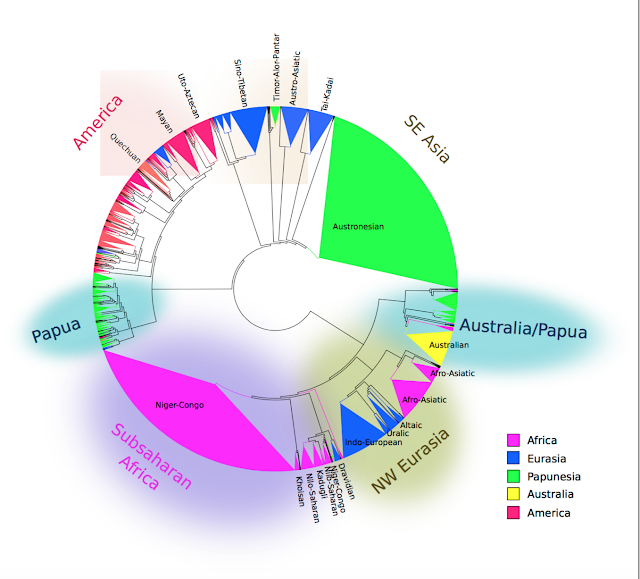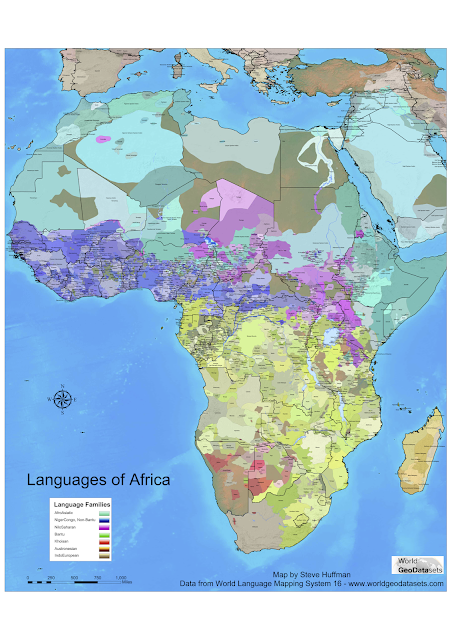Word classes, Oceanic and "I'm afraid of the language"
I'm was recently at a workshop on Lexical Flexability in Oceanic languages at Univeristy of Amsterdam (programme and abstracts here). Got some thoughts and and interesting glossed example for ya.
The workshop was about word classes/parts-of-speech and their nature in Oceanic languages, turns out it's very complex. For most comparativists and field workers these are very familiar problems, but it might surprise the others to learn that concepts such as "noun" and "verb" can be extremely complicated and often very hard to compare across different languages. For more on these kinds of discussions I recommend this blog post exchange: 1 and 2 (do read the comments and original paper).
Oceanic languages is a language grouping within the family of austronesian. It contains over 500 languages. The urheimat of the Austronesian language family is Taiwan, if you're interested in how it spread there's tons of reading (wiki intro, antrophological and genetic literature) The geographical distribution of Malayo-Polynesian (subgroup of Austronesian) is displayed in the image below, the yellow area is Oceanic. The image is from Encyclopaedia Britannica. The Austronesian languages that are not Malayo-Polynesian are all found in Taiwan.
There's an example sentence from a presentation here at the workshop that I wanted to share with you. It's from the language of Caac, an oceanic language of New Caledonia, presented by Cauchard from Manchester University.
no âza-ni le pela
translation: 'I'm afraid of the language'The workshop was about word classes/parts-of-speech and their nature in Oceanic languages, turns out it's very complex. For most comparativists and field workers these are very familiar problems, but it might surprise the others to learn that concepts such as "noun" and "verb" can be extremely complicated and often very hard to compare across different languages. For more on these kinds of discussions I recommend this blog post exchange: 1 and 2 (do read the comments and original paper).
Oceanic languages is a language grouping within the family of austronesian. It contains over 500 languages. The urheimat of the Austronesian language family is Taiwan, if you're interested in how it spread there's tons of reading (wiki intro, antrophological and genetic literature) The geographical distribution of Malayo-Polynesian (subgroup of Austronesian) is displayed in the image below, the yellow area is Oceanic. The image is from Encyclopaedia Britannica. The Austronesian languages that are not Malayo-Polynesian are all found in Taiwan.
There's an example sentence from a presentation here at the workshop that I wanted to share with you. It's from the language of Caac, an oceanic language of New Caledonia, presented by Cauchard from Manchester University.
no âza-ni le pela
| original | no | âza-ni | le | pela |
|---|---|---|---|---|
| gloss | 1SG.S | be.afraid-TR | def | speech |
Now, there are many interesting things in the data at this workshop concerning the morphology of all these languages and I cannot go through it all. The abbreviations in the above examples can be found at the end of this post.
What I'm interested in is this: this is a speaker of Caac talking about Caac, their own language. The utterance informs us that the speaker is scared or at least cautious, perhaps because the language is perceived as difficult by speakers and /or outsiders, perhaps of other reasons. Either way, I thought it was interesting and I wanted to share it with you.
Glossing abbreviations
1 - first person
SG - singular
S - subject
TR - transitivizing
Full reference: Chauchard, Aurélie (2014) Describing lexical flexibility Caac. Paper presented at the workshop on Lexical Flexibility in Oceanic languages at University of Amsterdam, Netherlands. (abstract here)




Comments
Post a Comment